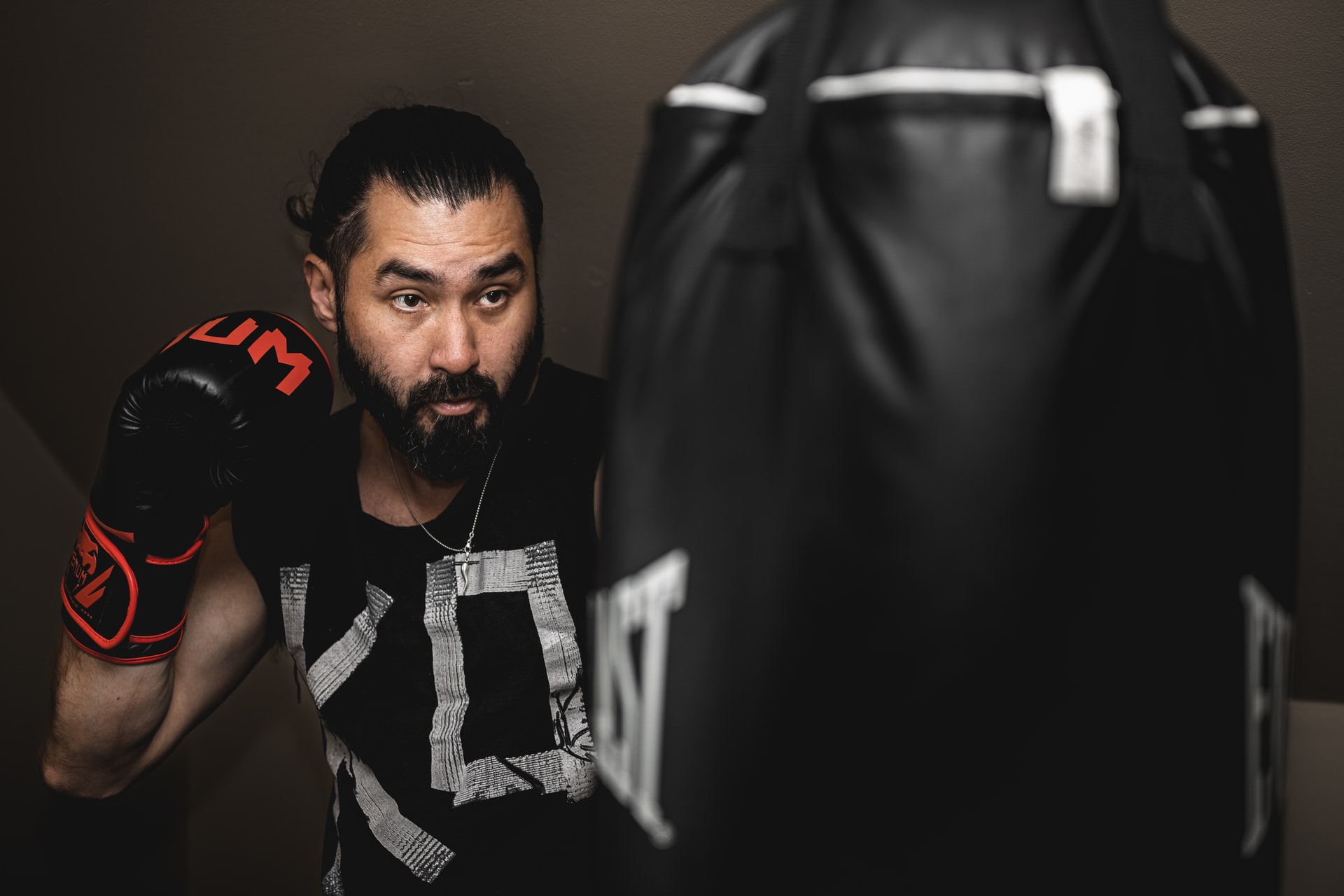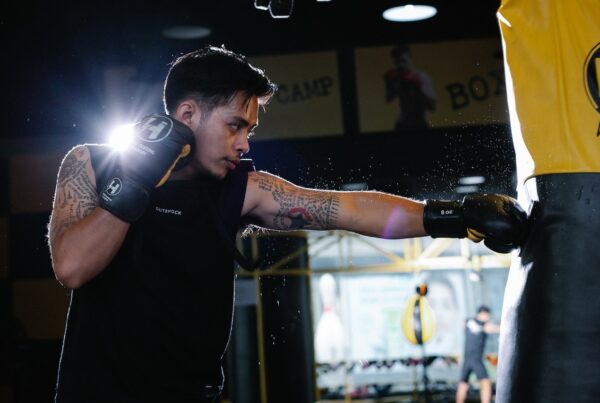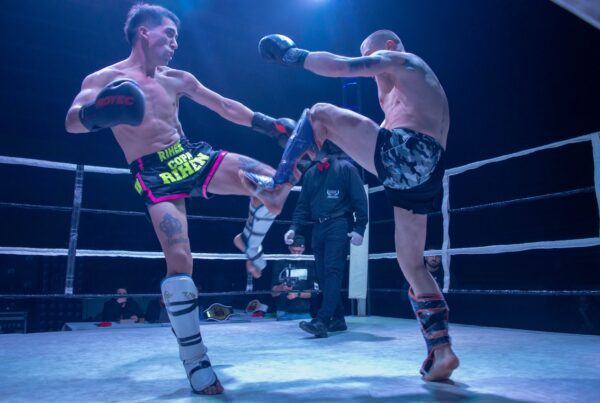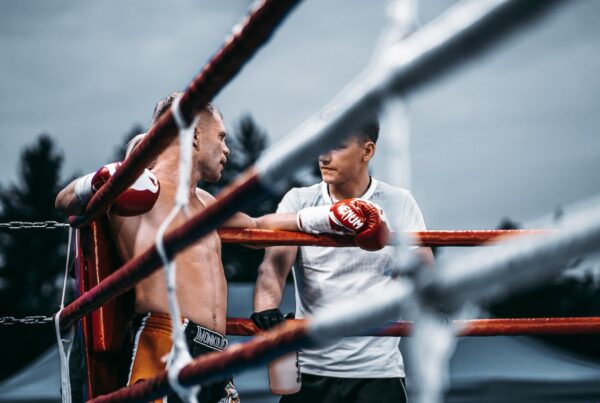Genetics plays a huge role when it comes to punching power, but all the physical attributes for a strong punch will become inadequate if a technique is deficient.
Having a significant punching power can be helpful when it comes to fighting because it makes you a winner quickly and with fewer shots.
Therefore, many boxers crave the ability to punch harder and to have that KO power to dominate with a single blow.
A huge question mark is put over the origin of punching power. Hence, many people quit boxing because they think they are not born for that.
When talking to them, I always tell a story about a guy from the local gym – his hands were a feather, and nothing on him was adequate for having a good punching power. Today, he is a boxing trainer.
This article will give you all the information you need and break every myth you have read or heard before.
Table of Contents
How Genetics Affect Punching Power
Genetic factors like muscle mass, body type, bone density, and joint flexibility can affect the power of a punch, as they allow you to generate more force with each strike.
Genes play a huge role in every part of our lives. Their presence can’t be controlled – you are born with it, and you can neither delete it nor create it.
Some people have the luck of having all the physical attributes for a nice, strong punch. Factors like body type, muscle mass, bone density, and joint flexibility can affect the punching power. They are 100% genetic and God-gifted.
It’s like some people have benefits, and genetics allow one person to have a higher ceiling than another.
Having some boxing-friendly characteristics is called talent, and talented people can recruit the needed muscles for punching without taking so much effort.
5 Genetic Traits That Help Increase Punching Power
1. Body Type
Athletic-type boxers with Mesomorph body type have a perfect balance of strength, endurance, and explosiveness, which gives them a great chance to punch really strong and dictate the whole pace of the fight.
People with a V-shaped body type (broad shoulders, large chest, and tight pelvis) can rotate their bodies really fast while punching.
A body rotation is an important factor that gives you an opportunity to deliver a hard punch to the opponent. Look at Connor McGregor – a V-shaped guy whose hard punches make him a winner.
2. Bone Density
Boxers with a high bone density can deliver a harder punch and therefore have an advantage over competitors.
The denser your bones, the stronger they are. They are less likely to break, too. This fact is important for boxers because they often deal with injuries and their recovery usually takes so long, and they can’t compete and keep in good shape.
3. Muscles Definition
Some people have a higher percentage of something called fast-twitch muscle fibers. These fibers can generate more power for a short period of time and give the boxer a victory.
Both upper and lower-body muscles are important for a hard punch, as it is a complex movement that involves both of these muscle groups. Therefore, people with strong muscles definitely have a hard, ‘winning’ punch.
Also, good genes that code strong muscles make the person have a good balance, which is very important when trying to throw a hard punch.
4. Joints And Ligaments
A joint structure is very important for boxers – joints transfer the energy through your body. You’re actually hitting the opponent with your joints – muscles generate the energy, but joints transfer it to the person you want to defeat.
They are movable and can be easily damaged. But if they are strong and flexible, injuries are less likely to happen, and the power transfer thing is going to be way more effective.
Ligaments are also important, as they are joint stabilizers. A good ligament structure helps the boxer punch harder, and it’s one of the most important factors when it comes to punching power.
5. Personality
If you punch with rage and get angry quickly, you are more likely to deliver a hard punch. Are you angry when you box? If yes, then you are probably punching harder than your usual self!
But punching with rage could actually be harmful in actual fights or matches. Punching with rage makes you careless and prone to taking the opponent’s bait.
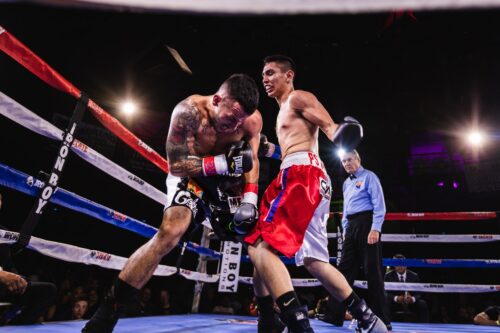
Muscle mass, body type, joints and even personality play a role in your punching power
5 Factors That Determine Punching Power
Punching power is a complex area dependent on a multitude of factors, such as age, weight, range of motion, strength, endurance, and technique.
A hard punch is not primarily genetic – you can train it and power it up. Some people do have more talent than others, but almost any person can learn to punch hard and become a great boxer.
A lot of factors determine punching power, but here are the main five explained in more detail. They are good to know because they can show you how to develop your punching power.
1. Age
A boxer hits the physical prime between the ages of 28 and 35. After that, the physical condition is no longer in its full shine, and its decline shows more and more over time.
As people get older, their muscle mass naturally deteriorates, and their punching power diminishes. This is because the muscles that produce force in punching lose their ability to do so effectively.
As a fighter ages, he is not able to train the same way as he used to, and throwing a punch in your fifties doesn’t feel like it was in your twenties or thirties.
Also, the bone density gets pretty low, and joints are weaker over time. That means the power translation to the opponent is weaker too, which affects the whole punching power thing.
Also, as you get older, you are more likely to be injured, and recoveries usually take so long, especially if you have your bone broken – they mineralize less, and they lose strength as you age.
But some boxers don’t quit, and they fight even though they are older than 35. They have more experience than younger boxers, that’s for sure. So, they use that knowledge to develop a specific technique that gives them a chance to win.
2. Weight
Weight is another factor that contributes to punching power. You don’t have to be a physics mastermind to understand this connection – the following equation will help you to understand it better:
Power= Mass x Velocity
Quickly mass moving is going to increase the punching power. It doesn’t mean you don’t have to go to the gym and can eat junk food – gaining weight needs to be effective and muscle-mass related.
If you are on a fitness level 0 with mostly fat tissue, it is the opposite – losing weight can increase your punching power.
People who are overweight or obese have less muscle mass and strength in their arms and shoulders, which leads to diminished punching power.
Remember that this factor is pretty restricted due to boxing weight categories.
3. Range Of Motion
If a person’s range of motion is restricted, including from arthritis or injuries, the muscle can’t contract as powerfully as it could if it had an unrestricted range of motion.
Force is generated from the floor and transferred to the upper body via forceful hip and torso rotation.
Poor mobility and underactive muscle groups can affect force transmission during a punch.
Also, it increases the activity in other muscles and tendons, forcing them to super-compensate. It can lead to some serious injuries.
4. Strength & Endurance
The more powerful your muscles are and the longer you can maintain a given level of intensity, the greater your punch will be.
As I mentioned, muscles are the location where the power is generated. Stronger muscles mean more power.
Also, the stronger you are, the more likely you can produce force quickly. That’s why it’s good to improve strength for boxing.
Boxers should develop both upper and lower-body muscles. Their strength improves your speed and momentum, which is important for developing a hard punch.
The correlation between strength and punching power is described in one research where 15 amateur boxers attended.
5. Technique
As I said, punching power is a complex area dependent on a multitude of factors. It is not primarily genetic, so it can be trained.
You can have all the physical attributes for a solid punch, but they will become inadequate if there is a deficiency in technique.
The key is to translate your strength into skilled action. Effective punching is a complex movement that involves both upper and lower-body musculature, and the proper coaction of agonist and antagonist muscles.
You can synchronize your body through a proper technique. If you are born with some great physical attributes, it doesn’t mean you don’t need any technique. It’s the opposite – it can improve your punching power by up to 20%.
Poor technique can greatly reduce a person’s ability to generate power and translate it to the opponent.
Do Bigger Hands Increase Punching Power?
Some experts believe that having larger hands can actually help you punch harder because your fists will have more surface area to connect with your opponent.
Many people wonder which size of hands is the best for boxing, as they are the most important thing in this field.
There is an advantage to having big hands, but that doesn’t mean that small hands should stop you from getting into boxing. So, you can start training to overcome those minor disadvantages of smaller hands.
But still, there is no definitive answer to this question since it is ultimately up to the individual to determine how much punching power they want to achieve.
Remember that any size of the hands can deal out a powerful blow if the correct technique is used to put as much force as possible behind the punch.
Does Muscle Mass Increase Punching Power?
People with more muscle mass punch harder than those with less muscle mass, as muscles produce more force in unison.
As I mentioned before, many factors affect punching power, but the less known one is muscle mass.
Research has shown that people with more muscle mass punch harder than those with less muscle mass.
There are two main types of muscle fibers in your body – slow-twitch and fast-twitch fibers. Slow-twitch muscle fibers fatigue slowly, and they are linked to endurance.
Another type of muscle fiber is more focused on raw power, and they help you punch harder.
Weightlifting targets both types of muscle fibers, which means it improves punching power, speed, and endurance.
Of course, everything needs to be in the range of normal – a comical size of muscles is not a boxer thing at all.
5 Steps To Increase Punching Power
Punching power is not primarily genetic. It is just a factor that synergizes with the training.
I have recently read a Jay Deas interview and his sentence – “One guy hits someone, and something happens – another guy hits someone, and nothing happens”.
And I think he wanted to say that some people have those ‘boxing’ genes, but they don’t improve their technique. Whereas some people train consistently and can have that significant KO power with no adequate physical attributes.
Therefore, it is possible for almost everyone to become a good boxer with a hard punch. In the following text, some steps for increasing the punching power are explained.
And another thing – these steps are not only for those who don’t have so many attributes for solid punches. You have to know that, even though you’re talented, you need to translate that genetic potential into a skill.
Step 1: Get in Shape
Physical fitness is one of the most important factors that can affect punching power. When you are in shape, your body is able to use more energy when you punch because your muscles are working together more efficiently.
You also tend to be less likely to get injured when punching, since your muscles will be stronger and you will be able to move faster. Finally, being in shape can also help improve your coordination and balance.
Step 2: Train Your Pec Muscles
Punching power is a result of muscular strength and endurance. To increase your punching power, you need to train your pecs regularly.
To maximize your punching power, you also need to develop good form. Keep your shoulder joint stable, keep your back straight, and keep your head up during the punch so that you can see the target more clearly.
Step 3: Train With Punching Bag or Partner
When it comes to punching power, you might think that weight and size are the only factors at play. But in reality, there are a few other things you need to take into account if you want to pack a punch.
First of all, your hand speed is key. If your punches are coming out slow and cumbersome, they’re not going to do much damage.
You also need good balance and coordination in order to hit your target accurately. And finally, practice makes perfect – so make sure to get plenty of reps in on the punching bag or with a partner!
Step 4: Practice Formations and Drills
One common misconception about punching power is that it is simply a matter of muscle size or strength. In fact, there are a number of factors that can affect punching power, including:
- The type of punch you use
- Your body position during the punch
- The speed and angle at which you deliver the punch
- Your opponent’s defense (e.g., if they are blocking your punches, how well are they doing it?)
- The terrain on which the fight takes place (e.g., if the ground is hard or soft)
Step 5: Increase Your Cardio
In order to increase punching power, you must increase your cardio. This can be done by running, biking, or any other form of cardio that will help you burn calories and increase your heart rate.
It is important to keep your workout routine varied in order to prevent boredom and ensure that you are getting the most out of your workout.
Additionally, make sure to drink plenty of water throughout the day in order to help keep your muscles hydrated and fueled for workouts.
Conclusion
Punching power is a complex area dependent on a multitude of factors. You can have all the physical attributes for a hard punch, but they will become inadequate if the technique is deficient.
Being talented doesn’t mean you don’t have to work on yourself, and having minor disadvantages doesn’t mean you have to quit boxing.
Genetics do play a role when it comes to punching power, but it is invisible without technique.
Therefore, genetics can do nothing without technique, while the technique can be sufficient even though a person struggles with a lack of physical attributes.



